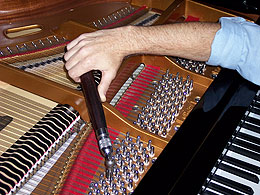 Often considered both an art and science, tuning a piano requires concentration, solid technique and lots and lots of practice. Originally an aural tuner, I now combine state-of-the-art electronic tools with a refined listening technique to deliver a stable, musical tuning to your beloved instrument. If you would like to learn more about how a piano is tuned, read my article What exactly is piano tuning and How is it Done?
Often considered both an art and science, tuning a piano requires concentration, solid technique and lots and lots of practice. Originally an aural tuner, I now combine state-of-the-art electronic tools with a refined listening technique to deliver a stable, musical tuning to your beloved instrument. If you would like to learn more about how a piano is tuned, read my article What exactly is piano tuning and How is it Done?
“Thanks Ron for tuning my pianos. My instruments sound amazing when you have tuned them! I recommend you to all my students and friends. And, of course, my church, OLA Claremont”.
~~MaryBeth W., Piano teacher
How do I Know a Good Tuning from a Bad One?
There are several characteristics of a good piano tuning. These include tuning stability, overall pitch, interval stretch, and unison accuracy. Combined, all of these factors contribute to the final quality of a piano tuning. Lets talk about them a little more.
The single most important characteristic of a quality piano tuning is STABILITY. Technicians use learned techniques to “set” the tuning pin to ensure it will stay where its put and that the string has equalized throughout its entire length. Some pianos just will not tune and remain stable if they are in a dilapidated condition or are of poor quality.
The OVERALL PITCH of a piano can fluxuate over time and is usually caused by changes in humidity. Pianos are designed to sound best at a standardized pitch – typically A440. Pianos tuned at regular intervals – one to two times a year – will often not need a pitch correction at every tuning.
INTERVAL STRETCH refers to the distance between musical intervals such as an octave, a major third, a perfect fifth, a minor sixth and so forth. Pianos sound more musical and pleasing when their intervals are well in tune.
Most of the strings on a piano are made up of two of three strings for each note. Only the low bass notes are a single string for each note. These groups of strings for each note need to be accurately tuned to sound the same, or in UNISON with each other. Doing this well is important to produce a clear, singular tone for each note.
How Often should my Piano be Tuned?
The frequency of piano tuning varies greatly. I have clients whose pianos are tuned as little as once every few years to others that are tuned every four to six weeks. Pianos used for concert performance or studio recording are normally tuned before every event. It really depends on the condition and quality of the instrument, the environment where the piano lives, and the needs of the player(s). Most manufacturers recommend tuning a new piano THREE to FOUR times the first year, and ONE to TWO times a year thereafter. The following are direct quotes from leading manufacturers.
Yamaha Pianos
New pianos should be tuned a minimum of four times the first year to compensate for the normal settling that takes place. Subsequently, as a matter of standard maintenance, a piano should be tuned at least twice a year.
Of course, some musicians will choose to have their own piano tuned more often to satisfy their own personal musical requirements.
When your piano needs tuning, consult your authorized Yamaha piano dealer or call a skilled qualified specialist such as a Piano Technicians Guild Registered Piano Technician (RPT).
Steinway & Sons (also Boston & Essex)
Your Steinway piano was tuned many times before it left our factory. It was tuned to and should be maintained at A440 pitch. This is the internationally accepted standard and the standard for which all Steinway pianos are engineered.
Unfortunately, no matter how expertly a piano is tuned, atmospheric variations and the nature of the piano’s construction constantly conspire to bring it off pitch.
Your Steinway has been designed and built so that in normal use and under normal conditions it should need only periodic tuning. We recommend that your technician be called at least three or four times a year. You, however, are the final judge and should have the piano tuned as often as you think necessary. To put the matter of tuning into perspective, remember that a concert piano is tuned before every performance, and a piano in a professional recording studio, where it is in constant use, is tuned three or four times each week as a matter of course.
Tuning is an art practiced by skilled professionals and under no circumstances should anyone other than a professional be allowed to tune your Steinway piano.
Baldwin Piano Company (also Chickering, Wurlitzer)
Professional service is the key. In the first year, the National Piano Manufacturers Association recommends that you have your piano tuned four times. This is a period of environmental adjustment for a new instrument, and proper attention is important.
After the first year, the piano should be tuned at least twice each year, depending upon the frequency of use and atmospheric conditions. Contact the Piano Technicians Guild for a list of qualified technicians to perform this service.